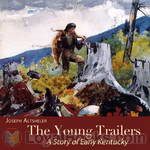|
Books Should Be Free Loyal Books Free Public Domain Audiobooks & eBook Downloads |
|
|
Books Should Be Free Loyal Books Free Public Domain Audiobooks & eBook Downloads |
|
History Books |
|---|
|
Book type:
Sort by:
View by:
|
By: John S. C. Abbott (1805-1877) | |
|---|---|
 Captain William Kidd And Others Of The Buccaneers
Captain William Kidd And Others Of The Buccaneers
Pirate stories galore! Pirate life was not always what it seemed from the outside. | |
By: John S. Jenkins (1818-1852) | |
|---|---|
 The Heroines of History
The Heroines of History
A look at some of the famous women in European history. Includes biographies on Cleopatra; Isabella of Castile; Joan of Arc; Maria Theresa; Josephine; Elizabeth of England; Mary of Scotland; Catherine of Russia; Marie Antoinette; and Madame Roland. Mr. Jenkins, whose name remains on the title-page of this volume, was prevented from finishing the work for a long time by sickness, and finally by death. The first chapter is from his pen, and the rest has been written according to his instructions by one whom he selected, and who has had access to works rare in this country, such as Monstrelet's Chronicles, Tooke's Life of Catherine II... | |
By: John Stuart Mill (1806-1873) | |
|---|---|
 Considerations on Representative Government
Considerations on Representative Government
Mill's volume was published in 1861 as an argument favoring this form of governance. Mill covers what forms of government work best, including when representative government is applicable and when not. He details appropriate functions of representative bodies and warns of problems to avoid. He distinguishes between true and false democracy. Other areas covered include how voting is carried out, the role of a second chamber in Parliament, and how an executive branch might function. | |
 Auguste Comte and Positivism
Auguste Comte and Positivism
Part 1 lays out the framework for Positivism as originated in France by Auguste Comte in his Cours de Philosophie Positive. Mill examines the tenets of Comte's movement and alerts us to defects. Part 2 concerns all Comte's writings except the Cours de Philosophie Positive. During Comte's later years he gave up reading newspapers and periodicals to keep his mind pure for higher study. He also became enamored of a certain woman who changed his view of life. Comte turned his philosophy into a religion, with morality the supreme guide. Mill finds that Comte learned to despise science and the intellect, instead substituting his frantic need for the regulation of change. | |
By: John Thomas McIntyre (1871-1951) | |
|---|---|
 In Texas with Davy Crockett
In Texas with Davy Crockett
A fictionalized biography of the famous frontiersman aimed at a juvenile audience. | |
By: John Tulloch (1823-1886) | |
|---|---|
 Rational Theology and Christian Philosophy volume 1
Rational Theology and Christian Philosophy volume 1
This work addresses the birth and development of a rationalist stream in the Christianity of England in the seventeenth century. In this volume, Tulloch focuses on five latitudinarian churchmen, examining their lives and thought. - Summary by Barry Ganong | |
 Rational Theology and Christian Philosophy volume 2
Rational Theology and Christian Philosophy volume 2
In this second volume of his work on English rational theology in the seventeenth century, Tulloch describes the lives and works of the group of theologians known as the Cambridge Platonists. - Summary by Barry Ganong | |
By: John Wesley Powell (1834-1902) | |
|---|---|
 Canyons of the Colorado, or The exploration of the Colorado River and its Canyons
Canyons of the Colorado, or The exploration of the Colorado River and its Canyons
John Wesley Powell was a pioneer American explorer, ethnologist, and geologist in the 19th Century. In 1869 he set out to explore the Colorado and the Grand Canyon. He gathered nine men, four boats and food for ten months and set out from Green River, Wyoming, on May 24. Passing through dangerous rapids, the group passed down the Green River to its confluence with the Colorado River (then also known as the Grand River upriver from the junction), near present-day Moab, Utah. The expedition’s route... | |
By: John William Norie (1772-1843) | |
|---|---|
 Piloting Directions for the Gulf of Finland
Piloting Directions for the Gulf of Finland
Norie's series of piloting and sailing directions was something of a staple in the chart-room of 19th century British (and other) merchant vessels. The description of landmarks and ports, as well as the rules and regulations provide another viewpoint to an earlier age. Please note that these piloting directions are rather completely out of date. They are given here for purposes of historical interest only, and should not be used for navigation purposes. | |
By: John Winthrop (1587-1649) | |
|---|---|
 History of New England, 1630-1649
History of New England, 1630-1649
John Winthrop served as governor of the Massachusetts Bay colony for several years. His History of New England, 1630-1649 details life in the colony and narrates several controversies that arose within the plantation. Examples include the excommunication of Anne Hutchinson and a civil suit over a sow that expressed the tension between the aristocracy and democracy and led to the establishment of the bicameral system within the New England government. The Pequod war, treaties with other Native American tribes such as the Naragnasetts, and the establishment of the United Colonies are also covered. | |
By: John Woodhouse Audubon (1812-1862) | |
|---|---|
 Audubon's Western Journal: 1849-1850
Audubon's Western Journal: 1849-1850
John Woodhouse Audubon , son of the famous painter John James Audubon and an artist in his own right, joined Col. Henry Webb's California Company expedition in 1849. From New Orleans the expedition sailed to the Rio Grande; it headed west overland through northern Mexico and through Arizona to San Diego, California. Cholera and outlaws decimated the group. Many of them turned back, including the leader. Audubon assumed command of those remaining and they pushed on to California, although he was forced to abandon his paints and canvases in the desert…... | |
By: Johnston McCulley (1883-1958) | |
|---|---|
 Mark of Zorro
Mark of Zorro
In Spanish California, a troubling pattern had developed. The natives were reduced to peasants, the Franciscan friars that ministered to them were derided, and the only people who mattered were the caballeros – who styled themselves as knights of the New World. These men strutted about in elegant clothes, riding magnificent horses, and sporting rapiers at their sides that they were quick to draw if they felt their honor was affronted. Into this world burst Zorro . A later-day Robin Hood, he stole from the rich and gave to the poor, but he also took it upon himself to punish men who had notably abused others... | |
By: Joseph Alexander Altsheler (1862-1919) | |
|---|---|
 The Young Trailers: A Story of Early Kentucky
The Young Trailers: A Story of Early Kentucky
This is the story of Henry Ware, a young boy living in the wilds of the Kentucky frontier of the 1700's. The story follows Henry as he helps to establish a frontier outpost, is captured by an Indian tribe, and ultimately ensures the safety and security of a band of settlers against the warring Shawnee Indians. The Young Trailers is action packed and brings to life the adventures that awaited the early settlers as they traversed into the endless forests of the American frontier. | |
 The Guns of Shiloh
The Guns of Shiloh
The Northern Army has just be handed a great defeat at Bull Run and is headed back to Washington, DC. How will the North answer this defeat? Follow our hero, Dick Mason, into the Western campaign to find out.This is the second book in the Civil War Series by Joseph A. Altsheler. | |
 The Star of Gettysburg
The Star of Gettysburg
The Army of Northern Virginia, still victorious after three hard years of fighting, capitalize on their victories at Fredericksburg and Chancellorsville, and a young Harry Kenton, is an eyewitness to the Confederate invasion of the north, culminating in the epic three-day struggle at Gettysburg, Pennsylvania, where Robert E. Lee puts into place a strategy that will end the war, or shatter his army. (Introduction by Robert Fletcher) | |
 Sword of Antietam
Sword of Antietam
"The Sword of Antietam" tells a complete story, but it is one in the chain of Civil War romances, begun in "The Guns of Bull Run" and continued through "The Guns of Shiloh" and "The Scouts of Stonewall." The young Northern hero, Dick Mason, and his friends are in the forefront of the tale. | |
 Rock of Chickamauga
Rock of Chickamauga
"The Rock of Chickamauga," presenting a critical phase of the great struggle in the west, is the sixth volume in the series, dealing with the Civil War, of which its predecessors have been "The Guns of Bull Run," "The Guns of Shiloh," "The Scouts of Stonewall," "The Sword of Antietam" and "The Star of Gettysburg." Dick Mason who fights on the Northern side, is the hero of this romance, and his friends reappear also. | |
 Scouts of Stonewall
Scouts of Stonewall
In this third book of Joseph Altsheler's Civil War series, Harry Kenton, a lieutenant in the Southern Army, is on scout patrol in the Shenandoah Valley. He has attracted the notice of the great General Stonewall Jackson after his regiment, the Invincibles of South Carolina, suffered great losses at the Battle of Bull Run. As the war continues, Harry meets each challenge that he faces with his close friends and fellow warriors. | |
 Shades of the Wilderness
Shades of the Wilderness
"The Shades of the Wilderness" is the seventh book of the Civil War Series by Joseph A. Altsheler. Picking up where "The Star of Gettysburg" left off, this story continues the Civil War experiences of Harry Kenton and his friends in the Southern army, from the retreat after Gettygurg, to Richmond, and then through the battles of the Wilderness and Spottsylvania, to Robert E. Lee's heroic stand during the siege of Petersburg. Other books in the Civil War series are: "The Guns of Bull Run," "The Guns of Shiloh," "The Scouts of Stonewall," "The Sword of Antietam", "The Star of Gettysburg","The Rock of Chickamauga", and "The Tree of Appomattox." | |
 Tree of Appomattox
Tree of Appomattox
"The Tree of Appomattox" concludes the series of connected romances dealing with the Civil War, begun in "The Guns of Bull Run," and continued successively through "The Guns of Shiloh," "The Scouts of Stonewall," "The Sword of Antietam," "The Star of Gettysburg," "The Rock of Chickamauga" and "The Shades of the Wilderness" to the present volume. It has been completed at the expense of vast labor, and the author has striven at all times to be correct, wherever facts are involved. So far, at least, no historic detail has been challenged by critic or reader... | |
By: Joseph B. Seabury (1846-1923) | |
|---|---|
 Porto Rico: The Land of the Rich Port
Porto Rico: The Land of the Rich Port
Puerto Rico was acquired by the United States in 1898 following the Spanish-American War. This volume was written in 1903 as Book XII in the series “The World and Its Peoples.” The series was intended for young people, but this work would be fun listening for those of any age interested in what Puerto Rico was like in the early 20th century. Intended to familiarize people in the U.S. with their new territory, topics include the island’s people, geography, climate, flora, fauna, and schools. There is also some coverage of Puerto Rican history and the new government established under U.S. rule. | |
By: Joseph Conrad (1857-1924) | |
|---|---|
 Under Western Eyes
Under Western Eyes
Under Western Eyes (1911) is a novel by Joseph Conrad. The novel takes place in St. Petersburg, Russia, and Geneva, Switzerland, and is viewed as Conrad's response to the themes explored in Crime and Punishment, Conrad being reputed to have detested Dostoevsky. It is also, some say, Conrad's response to his own early life; his father was a famous revolutionary imprisoned by the Russians, but, instead of following in his father's footsteps, at the age of sixteen Conrad left his native land forever... | |
By: Joseph Lewis French (1858-1936) | |
|---|---|
 Great Pirate Stories
Great Pirate Stories
Piracy embodies the romance of the sea at its highest expression. It is a sad but inevitable commentary on our civilization, that, so far as the sea is concerned, it has developed from its infancy down to a century or so ago, under one phase or another of piracy. If men were savages on land they were doubly so at sea, and all the years of maritime adventure–years that added to the map of the world till there was little left to discover–could not wholly eradicate the piratical germ. | |
By: Joseph Lievesley Beeston | |
|---|---|
 Five Months at Anzac
Five Months at Anzac
A Narrative of Personal Experiences of the Officer Commanding the 4th Field Ambulance, Australian Imperial Force from his leaving Australia December 1914 till his evacuation due to illness after 5 months at Gallipoli. Read to remember those who were there. (Introduction by Annise) | |
By: Joseph Martin McCabe (1867-1955) | |
|---|---|
 Empresses of Constantinople
Empresses of Constantinople
In concluding an earlier volume on the mistresses of the western Roman Empire I observed that, as the gallery of fair and frail ladies closed, we stood at the door of “the long, quaint gallery of the Byzantine Empresses.” It seemed natural and desirable to pass on to this more interesting and less familiar series of the mistresses of the eastern Roman Empire, and the present volume will therefore tell the story of the Empresses, or Queens, as they preferred to be called, who occupied the throne set up by Constantine in New Rome, or ancient Byzantium. | |
 Romance of the Romanoffs
Romance of the Romanoffs
The eighteenth, nineteenth and early twentieth centuries were periods of stark contrast between the opulent lifestyle of the rich and the extreme poverty of the peasants throughout the world. In addition, Russia straddled eastern and western cultures, not fitting neatly into either. The church was an important force, and those adhering to traditional eastern religions were peaceful and accustomed to 'doing as they were told'; followers of western thought were more eager for a democratic society. Add an autocratic czar and the conditions were ripe for revolution, corruption and murder... | |
By: Joseph Munk (1847-1927) | |
|---|---|
 Arizona Sketches
Arizona Sketches
An introduction to Arizona from approximately a century ago. | |
By: Joseph P. Cullen | |
|---|---|
 Richmond National Battlefield Park, Virginia
Richmond National Battlefield Park, Virginia
Richmond, Virginia, was the capital of The Confederacy during the American Civil War, 1861-1865. It was the focus of two military campaigns by Northern armies, one in the summer of 1862 and the second in 1864-1865. When the city was conquered and destroyed in early April, 1865, , it was only a few days later that General Lee surrendered to General Grant and the Civil War was over. Published in 1961, this is National Park Service Historical Handbook 33. The text contains many informative maps and interesting photographs. - Summary by david wales | |
By: Joseph Plumb Martin (1760-1850) | |
|---|---|
 A Narrative of a Revolutionary Soldier
A Narrative of a Revolutionary Soldier
Joining the Continental Army as a teenager, Joseph Plumb Martin spent the next eight years fighting in the Revolutionary War as an enlisted man. His memoirs tell in detail his experiences during that time...the bitter cold, hunger, loss of life, long marches, and fear of battle. He also includes tales of fishing, hunting, and other activities...including encounters with a "saucy miss". His narrative reveals much about American life at the time and is one of the fullest and best accounts of the Revolutionary War, presented from a private's point of view.The book has been later republished under the names Private Yankee Doodle and Memoir of a Revolutionary Soldier. | |
By: Joseph Rogers (1821-1889) | |
|---|---|
 Reminiscences Of A Workhouse Medical Officer
Reminiscences Of A Workhouse Medical Officer
Joseph Rogers was an English physician, medical officer, and health care reformer in London. The system of poor-law dispensaries and separate sick wards, with proper staffs of medical attendants and nurses, was due to the efforts of Rogers and his colleagues. His memoir, published in 1889, contains an informative biography written by his brother. His career was not without conflict as his zeal sometimes offended governing boards. - Summary by David Wales | |
By: Josephus | |
|---|---|
 The Wars of the Jews
The Wars of the Jews
The Wars of the Jews (or The History of the Destruction of Jerusalem, or as it usually appears in modern English translations, The Jewish War – original title: Phlauiou Iôsêpou historia Ioudaïkou polemou pros Rhômaious bibliona) is a book written by the 1st century Jewish historian Josephus. It is a description of Jewish history from the capture of Jerusalem by the Seleucid ruler Antiochus IV Epiphanes in 164 BC to the fall and destruction of Jerusalem in the First Jewish-Roman War in AD 70... | |
By: Joshua Giddings (1795-1864) | |
|---|---|
 Exiles of Florida
Exiles of Florida
“The Author of the following work has endeavored to give a faithful record of … the Exiles of Florida. Torn from their native land, their friends and homes, they were sold in the markets of Carolina and Georgia. Feeling the hand of oppression bearing heavily upon them, they fled to Florida, and, under Spanish laws, became free. … At a time of profound peace, our army, acting under the direction of the Executive, invaded Florida, murdered many of these free men, and brought others to the United States and consigned them to slavery... | |